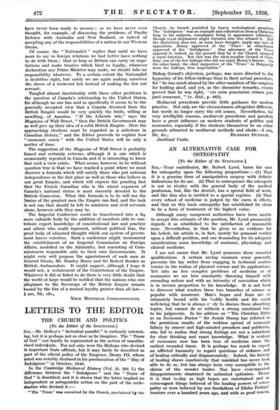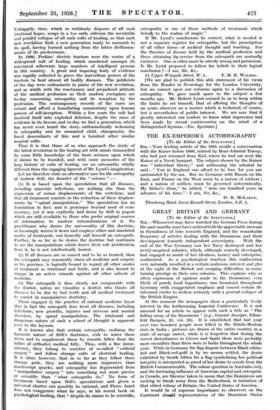AN ALTERNATIVE CASE FOR OSTEOPATHY
[To the Editor of the SPECTATOR.] SIR,—Your contributor, Mr. Robert Lynd, bases the case for osteopathy upon the following propositions :—(1) That it is a genuine form of manipulative surgery with definite indications for its use. (2) That in consequence the osteopath is not in rivalry with the general body of the medical profession, but, like the dentist, has a special field of work, and like him also is entitled to a special register. (3) That every school of medicine is judged by the cures it effects, and that on this basis osteopathy has established its claim to be a form of treatment of the highest value,
Although many competent authorities have been unable to accept this estimate of the position, Mr. Lynd presumably regards it as established to the satisfaction of reasonable men. Nevertheless, in that he gives us no evidence for his beliefs, his article is, in fact, merely his personal verdict upon a difficult problem, and one demanding for its adequate consideration some knowledge of anatomy, physiology and clinical medicine.
I am not aware that Mr. Lynd possesses these essential qualifications. A certain saving common sense generally prevents the lay writer from engaging in technical contro- versies in the realms of physical science and its applications. Yet into no less complex problems of medicine or of economics we see him constantly throwing himself with crusading ardour and with an intensity of conviction which is in inverse proportion to his knowledge. It is not hard to discover what renders these two branches of science so popular with amateurs. Man's hopes and fears are so intimately bound with his hadily health and his social well-being that he is always r---.dy to discuss these absorbing
topics, but cannot do so without a strong emotional bias to his judgments. In his address on "The Christian Ethic
as an Economic Factor" Sir Josiah Stamp has referred to
the pernicious results of the reckless spread of economic fallacy by sincere and high-minded preachers and publicists, who fail to realize that strong feelings are not a substitute for clear thinking and exact knowledge. What is evident of economics now has been true of medicine since the
earliest recorded times. It is perhaps too much to expect
an afflicted humanity to regard questions of sickness and of healing critically and dispassionately. Indeed, the history
of healing shows conclusively that mankind has never been able to do so, but has always been very susceptible to the claims of the wonder healer. Nor have ever-repeated
disappointments chastened its unlimited optimism. Hence it is that to-day as high hopes are entertained and as extravagant things believed of the healing powers of osteo: pathy as were believed by our-forefathers of Elisha Perkins tractors over a hundred years ago, and with as good reason,
Unhappily, time, which so ruthlessly disposes of all such irrational hopes, wraps in a -too early oblivion the inevitable and painful collapse of all such cults of healing, so that each new revelation finds a new generation ready to succumb to its spell, having learned nothing from the bitter disillusion- ments of its predecessors.
In 1800, Perkins' electric tractors were the centre of a widespread cult of healing, which numbered amongst its convinced adherents large numbers of intelligent persons in this country. A great and imposing body of evidence was rapidly collected to prove the marvellous powers of the tractors to heal almost all bodily diseases. The publicists of the day were enthusiastic in praise of the new revelation, and as wrath with the reactionary and prejudiced attitude of the medical profession as their modem exemplars are to-day concerning osteopathy and its reception by the profession. The contemporary records of the cures are extant and afford a humiliating commentary upon human powers of self-deception. Within a few years the cult had resolved itself into exploded delusion, despite the mass of evidence in its favour, and to-day we find a generation, which has never even heard the story, enthusiastically welcoming in osteopathy and its unwanted child, chiropractic, the lineal descendants of this and a hundred other similar magical cults.
Thus it is that those of us who approach the study of the latest revelation in the healing art with minds trammelled by some little knowledge of the basic sciences upon which it claims to be founded, and with some memories of the long history of cults of healing, see an osteopathy wholly different from the engaging figment of Mr. Lynd's imagination.
Let me therefore state an alternative case for the osteopathy of Andrew Still, the founder of the " science " (1) It is based upon the speculation that all diseases, including microbic infections, are nothing else than the expression of minor displacements of the vertebrae, and that all treatment consists in the reduction of these displace- ments by r" spinal manipulation." The speculation has no foundation in fact, and is grotesque beyond need of com- mentary, yet it was explicitly laid down by Still in papers which are still available to those who prefer original sources of information to modern rationalizations of it. No practitioner who denies the universality of this doctrine, or knowingly waters it down and employs other and unrelated modes of treatment, can honestly call himself an osteopath. Further, in so far as he denies the doctrine but continues to use the manipulations which derive their sole justification from it, he is not intellectually honest.
(2) If all diseases are so caused and to be so treated, then the osteopath may reasonably claim all medicine and surgery as his province, is logically bound to regard all other modes of treatment as irrational and futile, and is also bound to engage in an active 'crusade against all other schools of medicine.
(3) The osteopath is thus clearly not comparable with the dentist, unless -we vizualize a dentist who thinks all diseases to be due to bad teeth and all medical treatment to consist in manipulative dentistry.
• Those engaged in the practice of rational medicine know that in fact the osteopath does treat all diseases, including infections, new growths, injuries and nervous and mental disorders, by spinal manipulation. The irrational and dangerous nature of such a school of thought is apparent even to the layman.
It is known also that certain osteopaths, realizing the fantastic nature of Still's doctrines, seek to water them down and- to supplement them by crumbs fallen from the .tables of orthodox medical folly. Thus,- with a fine incon- sistency, they belong to societies of so-called " orificial -surgery ?' and follow strange cults of electrical healing. It is clear, however, that in so far as they follow these strange gods, they are nothing -more impressive than nondescript quacks, and osteopathy has degenerated from " manipulative surgery ". into something not more precise or scientific than " what osteopaths do." No form of treatment based upon Still's speculations and given a universal charter can possibly be rational, and Pierre Janet does not exaggerate when he says, in his recent book on psychological healing, that "despite its claims to be scientific, osteopathy is one of those methods of treatment which belont to the realms of Magic."
If Mr. Lynd's conclusions be correct, what is needed is not a separate register for osteopaths, but the proscription of all other forms of medical thought and teaching. For the theories of disease held by the medical profession and those obtaining lip-service from the osteopath are mutually exclusive. One or other must be utterly wrong and pernicious. Is Mr. Lynd prepared to follow his beliefs to their logical .conclusion l'—I am, Sir, &c., 12 Upper Wimpole Street, W. 1. F. M. R. WALsim.
[We- are glad to publish this able statement of his views from the Reader in Neurology for the London University, but we cannot open our columns again to a discussion of osteopathy. We gave much space to the subject a few months ago. Mr. Robert Lynd seemed to us to keep within the limits he set himself, that of offering the thoughts of an acute observer on a matter which is technical, of course, but is nevertheless of public interest. We are sure that it greatly interested our readers to know what impression had been .made by recent controversies on the mind of a distinguished layman.—ED. Spectator.]















































 Previous page
Previous page